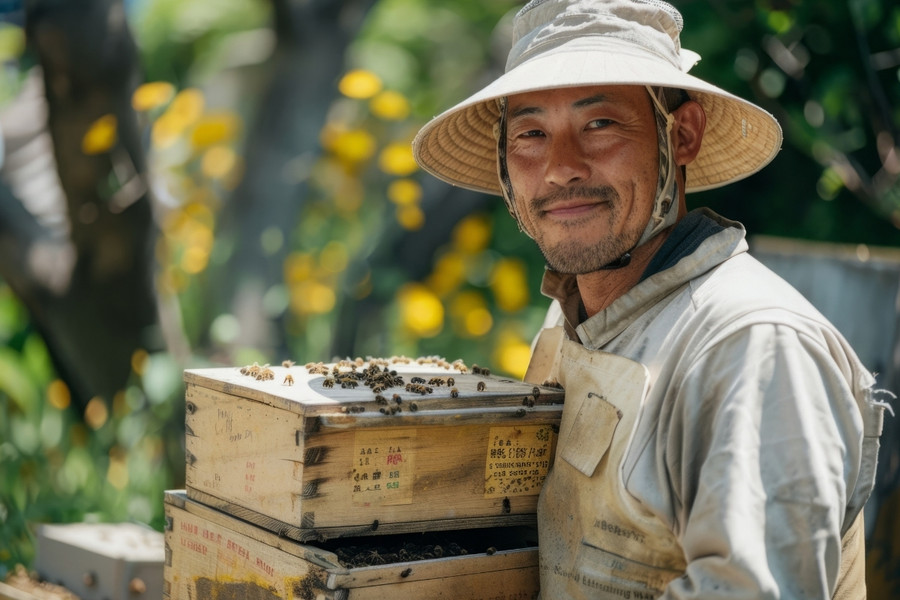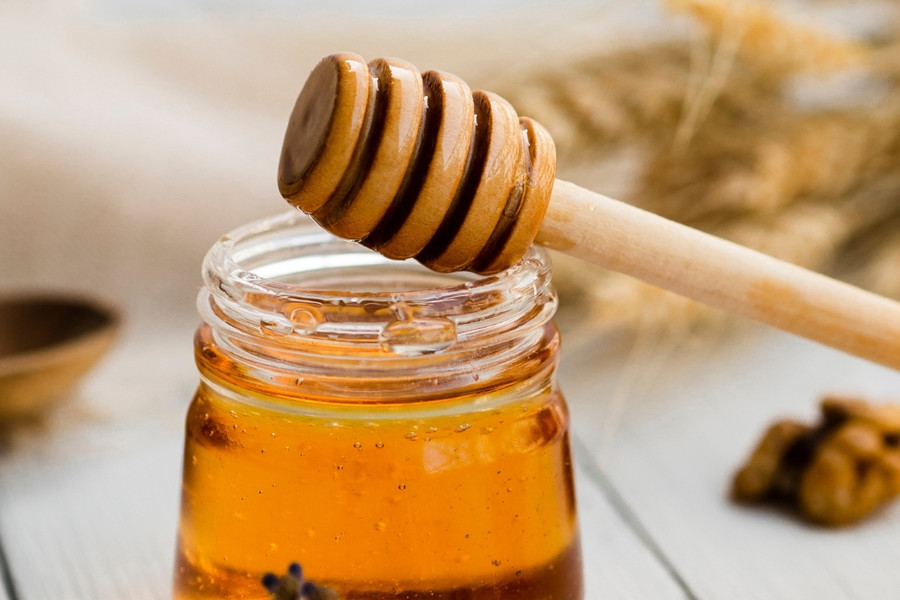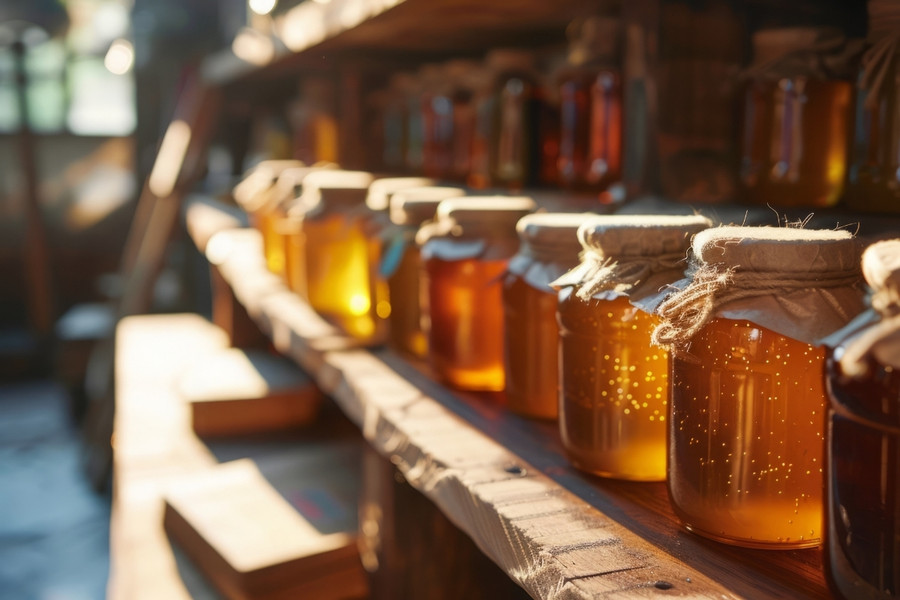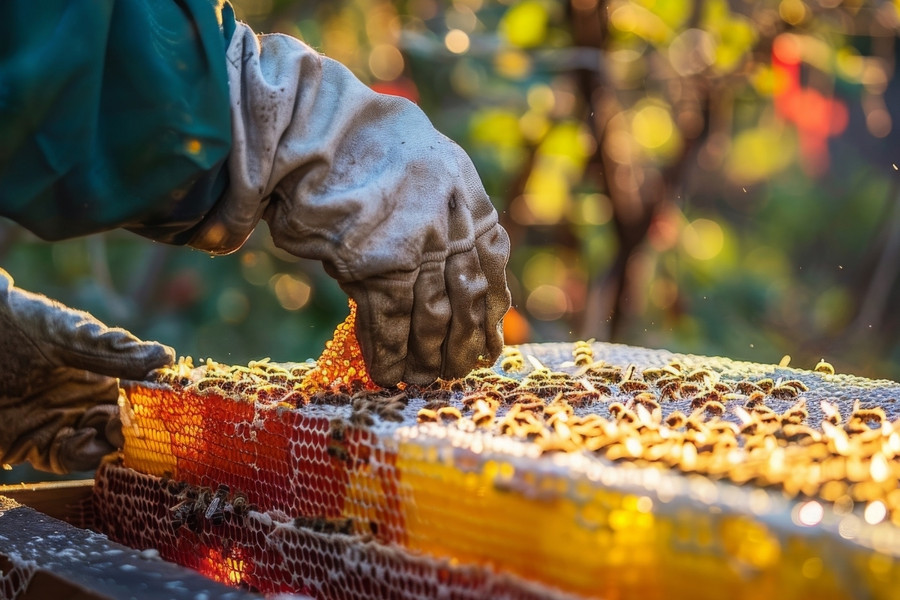In the mist-covered hills of Darjeeling, where ancient wisdom meets modern innovation, a quiet revolution is transforming the art of beekeeping. At IVY Multipurpose Cooperative Society, we’re not just producing honey—we’re reimagining how traditional knowledge can flourish alongside scientific advancement, creating a sustainable future that honors the past while embracing tomorrow.
The Heritage We Honor: Traditional Beekeeping in Darjeeling
For generations, the people of Darjeeling have understood the sacred relationship between humans and bees. Traditional beekeeping in our region wasn’t just an occupation—it was a way of life that connected communities to the natural rhythms of the mountains.
Ancient Wisdom: How Our Ancestors Kept Bees
Log Hive Traditions:
In the old days, beekeepers would hollow out logs from local trees, creating natural homes that mimicked wild bee colonies. These log hives, called “khatals” in local dialect, were placed in protected areas near water sources and flowering plants. The bees would build their combs naturally, creating honey that carried the pure essence of Darjeeling’s wild flora.
Seasonal Harmony:
Traditional beekeepers lived by the mountain’s calendar. They knew that:
- Spring brought rhododendron blooms and the first honey harvests
- Monsoon required protecting hives from excessive moisture
- Post-monsoon offered the richest, most complex honey flavors
- Winter meant minimal disturbance, allowing bees to rest and rebuild
Community Knowledge:
Beekeeping wisdom was passed down through families and communities. Elder beekeepers would teach younger generations to:
- Read weather patterns and predict bee behavior
- Identify the best flowering seasons for different honey types
- Use smoke from specific plants to calm bees during harvests
- Recognize signs of healthy vs. stressed bee colonies
Natural Materials:
Everything was sourced from the immediate environment:
- Hives: Hollowed logs from fallen trees
- Smokers: Dried leaves and herbs from local plants
- Tools: Handcrafted implements made from bamboo and wood
- Protective Gear: Thick cloths and natural fiber wrappings
The Beautiful Limitations of Tradition
While traditional methods created excellent honey, they also faced inherent challenges:
Limited Productivity: Log hives typically produced 5-15 kg of honey per year, as natural comb structures weren’t optimized for maximum honey storage.
Unpredictable Harvests: Without scientific understanding of bee biology, harvests were often weather-dependent and inconsistent.
Colony Management: Traditional methods offered limited ability to monitor bee health, manage diseases, or prevent swarming.
Seasonal Vulnerability: Colonies were more susceptible to extreme weather, pests, and diseases without modern intervention capabilities.
Knowledge Gaps: While traditional wisdom was profound, it lacked scientific understanding of bee nutrition, genetics, and disease management.
The Modern Revolution: Science Meets Sustainability
At IVY Multipurpose Cooperative Society, we recognized that honoring tradition doesn’t mean rejecting progress. Our modern beekeeping revolution began with a simple question: “How can we amplify the wisdom of our ancestors using the tools of today?”
Scientific Foundation: Understanding Our Partners
Bee Biology Education:
Our modern approach begins with deep scientific understanding. We train our 100+ beekeepers in:
- Bee lifecycle management: Understanding egg, larva, pupa, and adult stages
- Colony dynamics: How queen, worker, and drone bees interact
- Nutritional needs: What bees require for optimal health and productivity
- Disease recognition: Early identification and treatment of common bee ailments
- Seasonal behavior patterns: Scientific understanding of bee responses to environmental changes
Data-Driven Decisions:
Modern beekeeping relies on measurable outcomes:
- Hive weight monitoring: Electronic scales track honey production in real-time
- Temperature regulation: Digital thermometers ensure optimal hive conditions
- Productivity metrics: Detailed records of each hive’s performance over time
- Health assessments: Regular colony inspections using standardized protocols
Modern Equipment: Tools for Better Outcomes
Langstroth Hives:
We’ve transitioned from traditional log hives to modern Langstroth hives that offer:
- Modular Design: Expandable boxes that grow with colony size
- Removable Frames: Easy inspection without destroying natural comb
- Improved Ventilation: Better air circulation for colony health
- Weather Protection: Durable materials that withstand Darjeeling’s variable climate
- Increased Productivity: Hives now produce 25-40 kg of honey annually—a 150% increase over traditional methods
Professional Protective Gear:
Modern safety equipment ensures both beekeeper and bee welfare:
- Full bee suits: Complete protection allowing confident hive management
- Ventilated masks: Clear visibility with proper airflow
- Leather gloves: Dexterous handling while preventing stings
- Professional smokers: Consistent, controlled smoke production
Specialized Tools:
- Hive tools: Precision instruments for frame manipulation
- Uncapping knives: Efficient honey extraction without comb damage
- Extractors: Mechanical honey removal preserving comb for reuse
- Refractometers: Accurate moisture content measurement for quality control
Quality Control Revolution
Hygienic Processing:
Modern honey processing follows international standards:
- Stainless steel equipment: Food-grade materials preventing contamination
- Controlled environments: Clean rooms for extraction and bottling
- Temperature control: Precise heating that preserves honey’s beneficial properties
- Filtration systems: Removing impurities while retaining natural enzymes
Testing and Certification:
Every batch undergoes rigorous quality assessment:
- Moisture content analysis: Ensuring optimal preservation
- Purity testing: Confirming absence of adulterants
- Microbial safety: Verifying freedom from harmful bacteria
- Trace element analysis: Documenting beneficial mineral content
The Hybrid Approach: Best of Both Worlds
Our revolutionary approach doesn’t abandon traditional wisdom—it amplifies it with modern tools and scientific understanding.
Wisdom-Guided Innovation
Traditional Knowledge + Scientific Validation:
- Seasonal Timing: We use traditional flowering calendars validated by modern botanical studies
- Plant Wisdom: Ancient knowledge of bee-friendly plants is enhanced by nutritional analysis
- Weather Patterns: Traditional weather reading is supported by meteorological data
- Natural Remedies: Folk treatments for bee ailments are tested and refined using modern protocols
Sustainable Intensification:
- Higher Productivity: Modern hives produce more honey without harming bee welfare
- Reduced Environmental Impact: Efficient practices minimize resource consumption
- Enhanced Bee Health: Scientific colony management improves bee survival rates
- Quality Improvement: Modern processing preserves more beneficial compounds
Community-Centered Modernization
Inclusive Training Programs:
Our modernization process includes every community member:
- Elder Integration: Experienced traditional beekeepers become mentors in hybrid programs
- Youth Engagement: Younger generations learn both traditional wisdom and modern techniques
- Women’s Empowerment: Modern equipment makes beekeeping accessible to female community members
- Skill Development: Comprehensive training covers everything from basic bee biology to advanced hive management
Knowledge Sharing Networks:
- Peer-to-Peer Learning: Successful beekeepers mentor newcomers
- Regular Workshops: Monthly training sessions on new techniques and equipment
- Digital Documentation: Traditional knowledge is recorded and preserved for future generations
- Cooperative Support: Shared resources and collective problem-solving
Measurable Impact: The Numbers Tell the Story
Productivity Revolution
Traditional Methods (Pre-2020):
- Average honey production: 8-12 kg per hive annually
- Number of active beekeepers: 25-30
- Honey quality: Variable, limited quality control
- Income generation: ₹15,000-25,000 per beekeeper annually
Modern Methods (2024):
- Average honey production: 25-40 kg per hive annually
- Number of active beekeepers: 100+
- Honey quality: Consistent, certified quality standards
- Income generation: ₹35,000-55,000 per beekeeper annually
- Total revenue generated: ₹6,41,450 in recent seasons
Colony Health Improvements
Survival Rates:
- Traditional methods: 60-70% colony survival through winter
- Modern methods: 85-95% colony survival with proper management
Disease Management:
- Traditional approach: Limited treatment options, reactive responses
- Modern approach: Preventive care, early intervention, 90% disease prevention success rate
Swarming Control:
- Traditional methods: Natural swarming led to 30-40% colony loss
- Modern methods: Managed swarming retains 95% of colonies while allowing natural reproduction
Quality Enhancements
Honey Purity:
- Traditional extraction: 85-90% purity (natural filtration)
- Modern extraction: 98-99% purity (controlled processing)
Shelf Life:
- Traditional storage: 6-12 months optimal quality
- Modern processing: 24+ months optimal quality retention
Consistency:
- Traditional methods: Seasonal variation in quality and availability
- Modern methods: Consistent quality with documented traceability
Innovation Spotlight: Our Groundbreaking Practices
Digital Traceability System
We’re implementing cutting-edge technology to track every jar from hive to consumer:
QR Code Integration:
Each honey jar will feature a unique QR code linking to:
- Hive location: GPS coordinates of source hives
- Harvest date: Exact timing of honey extraction
- Beekeeper profile: Information about the producer
- Flowering sources: Detailed information about nectar sources
- Processing timeline: Complete journey from hive to jar
Blockchain Documentation:
Implementing blockchain technology for:
- Immutable records: Tamper-proof documentation of honey journey
- Quality certification: Verified testing results and quality metrics
- Sustainability tracking: Environmental impact documentation
- Fair trade verification: Transparent compensation for beekeepers
Precision Beekeeping
IoT Monitoring Systems:
Advanced sensors in modern hives track:
- Internal temperature: Optimal brood development monitoring
- Humidity levels: Preventing moisture-related issues
- Hive weight: Real-time honey production tracking
- Activity patterns: Bee behavior analysis for health assessment
Predictive Analytics:
Using data to anticipate:
- Optimal harvest timing: Maximizing honey quality and quantity
- Disease prevention: Early warning systems for colony health issues
- Weather adaptation: Preparing colonies for environmental challenges
- Resource planning: Efficient allocation of equipment and labor
Sustainable Intensification
Regenerative Practices:
- Pollinator gardens: Planting bee-friendly flowers to enhance nutrition
- Natural pest management: Biological controls replacing chemical interventions
- Habitat restoration: Rehabilitating degraded areas for bee forage
- Water conservation: Efficient irrigation systems for bee-friendly plants
Circular Economy Integration:
- Beeswax utilization: Creating value-added products from hive byproducts
- Propolis harvesting: Collecting and processing bee-made antibiotics
- Pollen collection: Sustainable superfood production
- Waste minimization: Zero-waste approach to all beekeeping activities
Training Revolution: Building the Next Generation
Comprehensive Education Programs
Scientific Beekeeping Curriculum:
Our training programs cover:
Module 1: Bee Biology and Behavior
- Anatomy and physiology of honey bees
- Colony social structure and communication
- Seasonal lifecycle and reproductive patterns
- Foraging behavior and navigation systems
Module 2: Modern Hive Management
- Langstroth hive assembly and maintenance
- Frame management and comb inspection
- Queen identification and management
- Swarm prevention and control techniques
Module 3: Health and Disease Management
- Common bee diseases and parasites
- Preventive care protocols
- Natural treatment methods
- When and how to seek veterinary assistance
Module 4: Honey Production and Processing
- Optimal harvesting techniques
- Hygienic extraction methods
- Quality testing and certification
- Packaging and storage best practices
Module 5: Business and Sustainability
- Record keeping and financial management
- Marketing and direct sales strategies
- Cooperative principles and collective action
- Environmental stewardship and conservation
Hands-On Learning Approach
Mentorship Programs:
- Experienced beekeepers paired with newcomers
- Monthly field visits and practical demonstrations
- Problem-solving workshops using real scenarios
- Peer support networks for ongoing assistance
Technology Integration:
- Tablet-based learning modules for field reference
- Video documentation of best practices
- Digital record-keeping training
- Quality control app usage and interpretation
Challenges and Solutions: Our Learning Journey
Bridging the Generation Gap
Challenge: Some traditional beekeepers were initially resistant to modern methods, viewing them as abandoning ancestral wisdom.
Solution: We created “wisdom circles” where elder beekeepers shared their knowledge while learning about modern techniques. This approach showed that modern methods enhanced rather than replaced traditional wisdom.
Result: 95% of traditional beekeepers now use hybrid approaches, combining ancestral knowledge with modern tools.
Equipment Accessibility
Challenge: Modern beekeeping equipment represented a significant initial investment for small-scale beekeepers.
Solution: IVY Cooperative implemented a shared equipment program and provided microfinance options for individual purchases.
Result: 100% of our beekeepers now have access to modern equipment through ownership or cooperative sharing.
Technical Knowledge Transfer
Challenge: Translating complex scientific concepts into practical, actionable knowledge for beekeepers with varying educational backgrounds.
Solution: We developed visual learning materials, hands-on demonstrations, and peer-to-peer teaching programs that made scientific concepts accessible to everyone.
Result: Post-training assessments show 90% knowledge retention and practical application rates.
Market Adaptation
Challenge: Higher-quality honey commanded premium prices, but required education of consumers about value differences.
Solution: We created transparency initiatives, including facility tours, educational materials, and direct consumer engagement programs.
Result: Our premium honey varieties now achieve 25-30% higher prices than conventional honey in local markets.
Environmental Impact: Sustainability at Scale
Biodiversity Enhancement
Traditional Impact:
- Limited bee populations supported local plant pollination
- Seasonal honey collection had minimal environmental footprint
- Traditional practices were inherently sustainable but small-scale
Modern Enhancement:
- Expanded bee populations: 300% increase in managed bee colonies
- Pollination services: Enhanced agricultural productivity across the region
- Habitat creation: Establishment of bee-friendly corridors and forage areas
- Species preservation: Supporting native bee populations alongside managed colonies
Carbon Footprint Management
Efficient Operations:
- Local sourcing: All equipment and materials sourced within 50km when possible
- Reduced transport: Centralized processing reduces honey transportation
- Energy efficiency: Solar-powered extractors and processing equipment
- Waste reduction: Zero-waste processing with byproduct utilization
Carbon Sequestration:
- Pollinator gardens: Thousands of flowering plants capture atmospheric carbon
- Forest conservation: Beekeeping provides economic incentives for forest preservation
- Sustainable agriculture: Enhanced pollination reduces need for external inputs
Water Conservation
Smart Water Management:
- Rainwater harvesting: Collection systems for bee watering stations
- Efficient irrigation: Drip systems for pollinator gardens
- Wetland preservation: Protecting natural water sources for bee colonies
- Quality monitoring: Regular testing ensures clean water for bee health
Economic Transformation: Beyond Individual Income
Community-Wide Impact
Direct Benefits:
- 100+ beekeepers earning 150% more than traditional methods
- ₹6,41,450 generated in recent seasons with projections for 30% annual growth
- 25 new full-time equivalent jobs created in honey processing and packaging
- Skills development programs benefiting 200+ community members
Indirect Economic Effects:
- Increased agricultural yields: Enhanced pollination improves crop production by 20-30%
- Tourism opportunities: Educational beekeeping tours attract visitors
- Value-added products: Beeswax candles, propolis tinctures, and pollen supplements
- Market development: Darjeeling honey gaining recognition in premium markets
Financial Sustainability Model
Cooperative Structure:
- Shared investments: Collective purchasing reduces individual equipment costs
- Risk distribution: Cooperative insurance and support systems
- Knowledge pooling: Shared expertise and problem-solving
- Market power: Collective bargaining for better prices and terms
Scalable Growth:
- Phase 1 Complete: 100 beekeepers producing 958 kg honey annually
- Phase 2 Planned: 250 beekeepers targeting 2,000 kg annual production
- Phase 3 Vision: 500 beekeepers with integrated processing facility
- Long-term Goal: Regional hub for premium honey production and export
Innovation Pipeline: What’s Next
Honey World Bee Theme Park
Our most ambitious project combines education, tourism, and sustainable development:
Educational Components:
- Interactive bee biology exhibits
- Live observation hives with viewing windows
- Traditional and modern beekeeping demonstrations
- Honey tasting and pairing workshops
Research Facilities:
- Bee breeding and queen development programs
- Native bee species conservation initiatives
- Climate adaptation research for beekeeping
- Sustainable agriculture integration studies
Tourism Integration:
- Guided tours of active apiaries
- Hands-on beekeeping experiences for visitors
- Farm-to-table honey cuisine experiences
- Seasonal festivals celebrating honey harvest
Economic Impact:
- 50+ new jobs in tourism and education sectors
- Estimated 10,000+ annual visitors
- Revenue diversification beyond honey sales
- International recognition for Darjeeling beekeeping
Technology Advancement
AI-Powered Hive Management:
- Machine learning analysis of hive sounds and vibrations
- Predictive modeling for optimal harvest timing
- Automated disease detection through image analysis
- Personalized recommendations for each hive’s management
Blockchain Integration:
- Complete supply chain transparency
- Smart contracts for fair trade payments
- Quality certification verification
- Environmental impact tracking
Mobile Technology:
- Beekeeping apps for real-time hive monitoring
- Weather alerts and advisory systems
- Peer communication and knowledge sharing platforms
- Digital marketplace for direct sales
Global Expansion
International Recognition:
- Organic certification for international markets
- Participation in global honey competitions
- Export development to premium markets
- Brand recognition as “Darjeeling Honey”
Knowledge Transfer:
- Consultancy services for other beekeeping cooperatives
- Training programs for international beekeepers
- Research collaboration with universities
- Model replication in similar mountain regions
Lessons Learned: Wisdom for the Future
Cultural Sensitivity
What We Learned: Modernization must respect and incorporate traditional knowledge rather than replacing it.
How We Applied It: Elder beekeepers became co-teachers in our training programs, ensuring traditional wisdom remained central to our approach.
Future Application: All innovation will be filtered through traditional knowledge keepers to ensure cultural continuity.
Gradual Implementation
What We Learned: Rapid changes can overwhelm communities and lead to rejection of beneficial innovations.
How We Applied It: We introduced modern techniques gradually, allowing beekeepers to adapt at their own pace.
Future Application: New technologies will be introduced through pilot programs before full implementation.
Community Ownership
What We Learned: Sustainable change requires community buy-in and ownership rather than external imposition.
How We Applied It: Beekeepers participate in all decision-making about new techniques and equipment.
Future Application: Community governance structures will guide all future development initiatives.
Quality Over Quantity
What We Learned: While increased production is important, quality and sustainability must remain paramount.
How We Applied It: We invested in quality control and sustainable practices even when they reduced short-term profits.
Future Application: All expansion plans prioritize environmental sustainability and product quality.
A Sweet Future: Where Tradition Meets Tomorrow
The revolution in Darjeeling beekeeping isn’t just about producing more honey—it’s about creating a sustainable model where traditional wisdom and modern innovation create something greater than the sum of their parts. Our approach demonstrates that progress doesn’t require abandoning heritage; instead, it can amplify the best of traditional practices while addressing their limitations through thoughtful application of modern knowledge and technology.
Our Vision for 2030
Community Transformation:
- 500+ beekeepers using hybrid traditional-modern practices
- Average annual income increase of 200% compared to traditional methods
- Complete women’s participation in beekeeping across all villages
- Youth engagement ensuring knowledge transfer to next generation
Environmental Leadership:
- Regional biodiversity enhancement through strategic bee corridor development
- Carbon-neutral honey production through renewable energy and sustainable practices
- Restoration of 1,000+ acres of degraded land through bee-friendly plantations
- Model for sustainable agriculture integration across the Himalayas
Global Recognition:
- Darjeeling Honey recognized as premium brand internationally
- IVY Cooperative model replicated in 10+ similar regions worldwide
- Research publications on traditional-modern beekeeping integration
- UNESCO recognition for cultural and environmental preservation
Innovation Hub:
- Honey World Bee Theme Park attracting international visitors
- Research facility advancing mountain beekeeping science
- Training center for beekeepers from across South Asia
- Technology development for small-scale sustainable agriculture
The Ripple Effect
Our revolution extends far beyond honey production. By demonstrating that traditional knowledge and modern innovation can work together, we’re creating a model for sustainable development that:
- Preserves Culture: Traditional beekeeping wisdom is documented and celebrated
- Empowers Communities: Local people control their own economic development
- Protects Environment: Enhanced bee populations support broader ecosystem health
- Inspires Innovation: Creative solutions emerge from traditional-modern synthesis
- Builds Bridges: Different generations and knowledge systems work together
Your Role in the Revolution
Every jar of honey you purchase from IVY Cooperative supports this ongoing revolution. You’re not just buying a product—you’re investing in:
- Sustainable Agriculture: Proving that environmental protection and economic development can coexist
- Cultural Preservation: Ensuring traditional knowledge is honored and preserved for future generations
- Community Empowerment: Supporting local beekeepers and their families’ prosperity
- Innovation: Funding continued research and development in sustainable beekeeping
- Education: Supporting training programs that spread knowledge and best practices
Join the Revolution
The transformation of Darjeeling beekeeping from traditional practices to modern excellence represents more than agricultural innovation—it’s a testament to human ingenuity, cultural respect, and environmental stewardship. As we continue to refine our practices and expand our impact, we invite you to be part of this sweet revolution.
Experience the Difference:
- Forest Honey (300g) – ₹399: Taste the complexity of traditional wild sources enhanced by modern quality control
- Multi-Floral Honey (300g) – ₹399: Enjoy the balance of diverse agricultural sources managed with scientific precision
- Tea Honey (300g) – ₹999: Savor the exclusive flavors possible only through innovative tea garden beekeeping
Each jar represents the perfect marriage of ancient wisdom and modern innovation—a sweet symbol of how tradition and progress can create something truly extraordinary.




